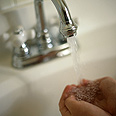
Israel plunges into water technology
Jewish state looking beyond its arid landscape, taking lead in latest export-oriented industry to help it weather effects of the global meltdown
In a country with few natural resources and where the most famous body of water is the Dead Sea, Israel is looking beyond its arid landscape and taking the lead in water technology, the latest export-oriented industry to help it weather the effects of the global meltdown.
The force behind the Jewish state's entry into the budding multibillion dollar industry has been decades of expertise in satisfying local demand. Now, a growing number of Israeli firms are eyeing lucrative overseas markets, offering cutting-edge expertise in areas such as desalination technology, sewage-eating bacteria and wastewater treatment.
"Israel is definitely one of the leaders, if not the leader, when it comes to water. ... I think of Israel as the Silicon Valley of water," said Shawn Lesser, president of Sustainable World Capital, an Atlanta investment group that focuses on clean energy and water technology companies.
Israel's emphasis on exporting high-tech innovations in areas like water technology played a major role in helping the country rebound before most other nations from the world's worst recession in decades, officials said.
"When you check the breakdown, the only market segment where the level of exports is higher than pre-crisis levels is in the high-tech sector," said Amit Friedman, head of the macroeconomic research department at the Bank of Israel.
Reflecting the growing prominence of water technology, Israel's fastest growing technology company this year was Aqwise, a water treatment company that uses small, bacteria-dispensing plastic cubes to break down sewage, increasing treatment efficiency and capacity.
Aqwise's vice president of business and development, Udi Leshem, said the firm has increased its sales by 50% this year by looking overseas. He declined to provide specific figures but said the nine-year-old company is profitable.
"The main growth engine of the company has been growing into foreign markets, starting in Israel as a base and then exporting to Europe, the United States and other places," he said. "Once we did that, growth accelerated."
Another company, Israeli start-up TaKaDu, has found a high-tech solution to the age-old problem of leaky pipes. Instead of relying on heavy wrenches and machinery, the software firm uses advanced algorithms and mathematical models to monitor for small leaks and unusual activity that lead to costly pipe bursts. It's selling the technology to water companies.
Water leaks cost utility companies $14 billion a year, according to a 2006 World Bank report. Halting these leaks could save enough water to meet the needs of an additional 200 million people a year, the report said.
Though other companies have attempted to crack the same problem, investors said TaKaDu – which is backed by several prominent venture capital funds but has yet to turn a profit – is one of the first software-only solutions.
"This technology is important. You have an enormous advantage if you can quickly know and can monitor where the leaks are coming from and fix them," said Raphael Semiat, a water technology expert at the Technion-Israel Institute of Technology in Haifa.
TaKaDu, at less than a year old, is now plugged in and running tests on Jerusalem's water system. "Essentially, they were blind to their network. We made them see," said Amir Peleg, TaKaDu's founder. TaKaDu is also conducting tests in Europe and Asia.
The country recently hosted its fifth annual Water Technologies, Renewable Energy and Environmental Control convention, where hundreds of firms displayed their innovations.
Increasing water conservation, production
Israel's interest in water technology goes back decades, an emphasis that started out of necessity in a country that is two-thirds desert, said WATEC Chairman Booky Oren.
"Here in Israel, we're faced with the water shortage problem every day," he said. "We need to produce technology that increases water conservation and production."
Shaul Arlosoroff, a leading Israeli water expert, said yearly consumption hovers around 200 cubic meters (7,000 cubic feet) per capita. That's about one-sixth the amount of water consumed by the average Californian, he said.
The push into water technology mirrors the aggressiveness of the resource-poor nation in other sectors. In a region where many of its neighbors hold some of the world's biggest oil reserves, Israel has none. Instead, it has long focused on high-tech development and environmental innovation.
Israel has become a hotbed for innovation in solar, battery and renewable energy technologies. Among its most famous ventures is "Better Place," a project founded by former SAP AG executive Shai Agassi that will set up a nationwide network of plug-in stations to recharge electric cars.
The firm, working with Nissan-Renault, hopes to reduce dependence on foreign oil and lower pollution levels.
In the water world, Israeli company Netafim pioneered drip irrigation, a technique that can grow crops in harsh conditions, in the 1960s. It has since grown into a global company with $500 million in annual sales.
Thanks to advances in wastewater treatment, most of the country's agriculture is now cultivated with recycled water, according to the Agriculture Ministry.
Only recently has Israel begun to realize the enormous opportunities of exporting its technology.
Israel's Trade Ministry hopes the country can export $2.5 billion in water technology in 2011, a jump from $1.4 billion last year and $750 million two years earlier.
"We're emphasizing growth in all sectors of water technology – drip irrigation, desalination, conservation, wastewater – everything," said Oded Distel, director of the ministry's national water technology program.










